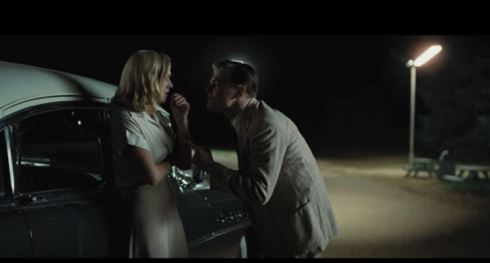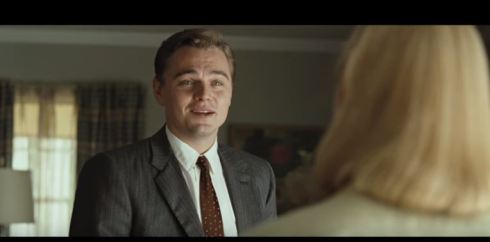WARNING – SPOILERS
Revolutionary Road-synopsis

Frank (played by Leonardo DiCaprio) and April (played by Kate Winslet) are a seemingly enviable couple, good looking, charming and living the American dream. But the whole construct of their suburbian life is falling apart at the seams, and it is questionable as to whether it was based on anything solid in the first place.
When April and Frank first meet, she has graduated from acting school and he ‘hasn’t figured out what he wants to do yet’. Fast forward ten years, and he is working in the same company as his father worked (ironically named ‘Knox’, for he never seems to be able to escape it) in a job he is indifferent to, and she, having failed in her acting career (perhaps not due to lack of talent, however) is a playing house in their pretty little suburban house, which borders the more and the less desireable part of Conneticut.
The movie is carefully crafted, sensitively acted and leaves you pondering over whether the middle class of America in the 50’s was all that it seemed. It also examines the nature of relationships.
On deeper analysis, Revolutionary Road is a movie that deals with scripts and scripting. All of us, to one extent or another act according to an inner script. The script could be a product of our education, our upbringing, trauma from our past or any number of things. But the more we try to distance ourselves from our script the more we become entangled in it. As an actress, April does not own a script, and this is why being tied down to traditions and expectations drives her to distraction. She finds the life of a fifties American housewife (although she excells at it) soul destroying because her dream (her script) always drove her towards wanting more (‘We were supposed to be special, Frank’). When she meets Frank, she is drawn to him because he too, at the outset, seems ‘scriptless’.
However, as years go on, Frank is moving towards the script of his father, and the more he tries to run away from it (he writes a careless letter to a company which is deemed as a ‘stroke of genius’ and is rewarded with a big promotion), he cannot contemplate his wife aborting their unborn child, and it is hinted, that although he hated his father, he is in many ways just like him (could it be that his father had affairs also?).
This helps explain why whenever he attempts to understand why April is mad with him she asks him to ‘just stop talking’, because their scripts are so incompatible. Whenever he attempts to solve a conflict, he resorts to his inner script, instead of moving to a new one, and thus sounding more and more like the people he claims to hate.
During the short period of time when the Wheelers agree to run away to Paris (representing freedom and an unscripted life) both Frank and April succeed in departing from their script. When they tell their friends and colleagues, the result is speechlessness and incomprehension. It is as if the script, the ‘chatter’ has been broken.
Hence in the final scene, when she has resigned herself to the fact that she cannot live with the script that has been imposed upon her, they act like two bad actors who’ve been given parts. But the difference is, he wants to believe that she has changed, and is happy about his ‘swell breakfast’

The ‘bard’ of the movie is John Givings, a brilliant but mentally disturbed mathematician, and the son of the Givings’ neighbors. He is the only person who actually speaks plainly to couple, without the censorship of what is socially acceptable or not. Initially the Wheelers find him refreshing, but when the plans to run away to Paris have been shelved by Frank, he is seen by Frank as a threat. Givings, as a mental patient is unscripted, and thus free to speak the truth, despite the efforts of his parents to rein him in and distract him.
For most of the characters in the movie, language is not a means of real communication or closeness. Each dialogue leads them to become more disassociated, rather than reaching any rapprochement. This is really because their language is simply utterances from their script (or lack of it).
However, being unscripted is not necessarily a solution to the malaise of the characters in the film. In many ways, marriage is a form of entrapment for April, and in her final attempt to escape impending motherhood, she unwittingly causes her own death. Her impetuousness and his domineering character mean that no middle ground can ever be found. Nor does being unscripted give John Givings any appeal to the viewer, his is simply tortured and miserable.
Thus viewers do not prefer one character over another. Perhaps the key is in the final scene, when the Mr. Givings Senior turns down his hearing aid in order to stop listening to the monologue of his wife. We can choose to hear the script we wish, and understand which script is false. If Frank had understood that his wife’s stilted script in their final scene was actually a cry for help, the events of the story might have unfolded differently.
